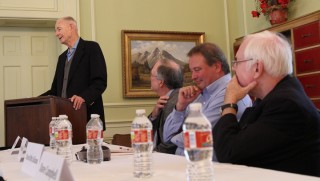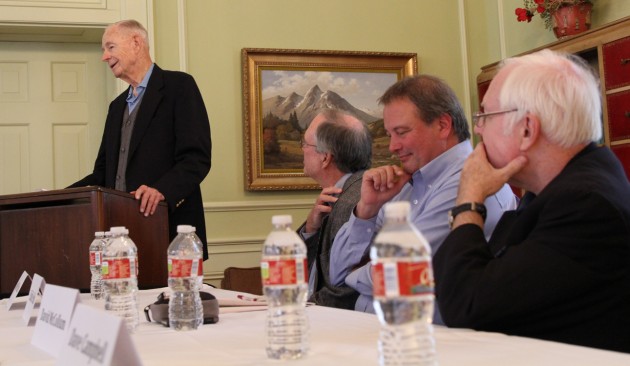
Chris Derrett | Lariat Editor-In-Chief
By Krista Pirtle
Sports Writer
Successful journalists do the little things right, panelists said at the sports writing panel as a part of the Legacy of Excellence in Journalism Education events last week.
The department of journalism, public relations and new media department hosted a sports writing panel Friday made up of four esteemed journalists who have accumulated more than 175 years of combined experience.
The moderator for the event was David Pickle, National Collegiate Athletics Association director of digital communications.
Alongside him were National Basketball Association writer for the Dallas Morning News Eddie Sefko; sports columnist at the Log Cabin Democrat in Conway, Ark., David McCollum; and longtime writer and editor for the Waco Tribune-Herald and founder of Texas Football magazine Dave Campbell.
The discussion covered topics such as the innovation behind the Texas Football Magazine, conference realignment and skills journalists need to know.
Campbell recounted the entire history of how he formed his renowned Texas Football magazine.
The idea sparked because Campbell would search the newsstands for college football information, especially any about the Southwest Conference, but could not find and adequate amount.
In the spring of 1960 he printed the first edition of the magazine, losing $5,000 in the process.
After five years and with the support of his wife, the magazine sales broke even and began a rise in readership that has continued to increase throughout the decades.
After Campbell finished his story and took his seat to the audience’s applause, the topic of conference realignment became a focus of the two-hour discussion.
McCollum referred to the realignment as the people creating a monster and then not knowing what to do with it.
“It’s like if you buy an alligator, and it gets too big for your house so you go to a swamp,” McCollum said. “Then you sell skyboxes at the swamp and have a television deal there as well. Pretty soon you should just take the gator to Florida. By the end of it, you aren’t sure who even bought the alligator in the first place.”
The panelists also pointed out that conferences are losing the sense of family.
“With schools jumping ship for money and better promises for recruiting, the makings of the conference have been stooped to the likeness of acquaintances,” Sefko said.
Other things have changed in the world of sports journalism over the years as well, especially with the presence of social media such as Facebook and Twitter.
The panel talked about with the ordinary person being able to tell the world whatever he wants to in a few seconds whenever he wants, the problem of credibility begins to appear. When the public wants information, it will often be content with the first answer it gets, not checking the credibility of the source.
McCollum said there is now a difference between consumers and seekers — all the public wants is information as soon as possible. The public does not look for information by researching the sources and comparing different findings.
Because of that, a journalist needs to check his or her credibility not just against the mainstream media but also against the users of social media as well, holding one’s self to a higher standard, Sefko said. Campbell followed up this argument by stressing the importance of judging the sources one follows.
If the only information a person receives is from a blog or a fan site, that information might just be assumptions and personal opinions rather than facts.
Sefko wrapped up the topic by discussing the problem journalists have when deciphering between reporting and commentary.
Rather than reporting only facts, Sefko said they can tend to insert their own opinions, and because readers do not check the accuracy of the article, they believe the opinion to be truth. Sefko said to avoid the problem, journalists and editors should ensure that opinion pieces are labeled appropriately.
The panelists left the discussion with the challenge to up-and-coming journalists to get their foot in the door for opportunities and to base their skills on storytelling, building upon it with multiple tasks such as editing and the ability to work both a professional camera and a television camera.




